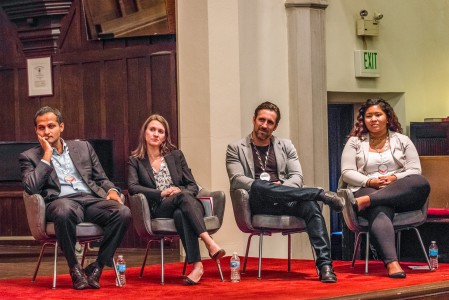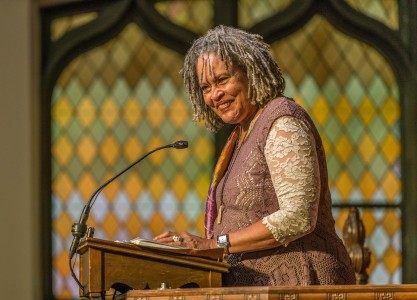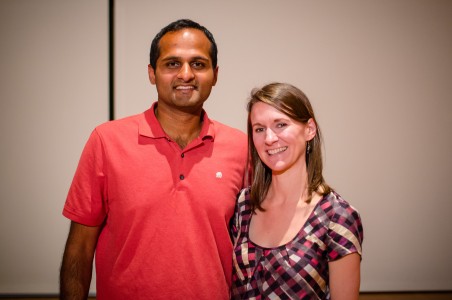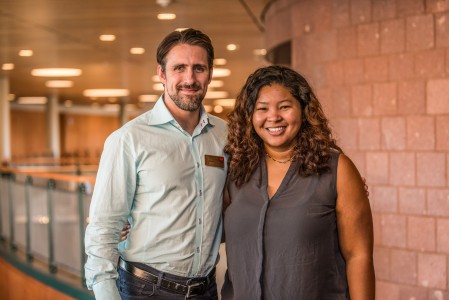This week, the Grinnell Prize Office honored Ani Vallabhaneni and Lindsay Stradley of Sanergy and Kiah Williams and Adam Kircher of SIRUM with the Grinnell College Young Innovator for Social Justice Prize. The Prize is given annually to individuals under the age of 40 who have worked towards positive social change anywhere in the world. Each organization received 100,000 dollars from the College for its efforts.

Photo by Chris Lee.
The Awards Ceremony, which took place Tuesday, featured keynote speaker Charlayne Hunter-Gault, an award-winning journalist, as well as the four Prize winners and an introduction from President Raynard Kington.
“Social commitment isn’t just an idea,” Kington said. “It’s not even just a core value. It is an essence that courses through the body of our community.”
Hunter-Gault, the first black woman to attend the University of Georgia, drew from her experience growing up in a radical time to deliver her talk focused on social justice, “My Sixties: Reflections on Coming of Age in the ‘Miracle Decade’ and Enduring Lessons.”
The vibrant 72-year-old talked about sit-ins and freedom riders and narrated some of the treacherous experiences that African-Americans faced in the South in the 1960s.
As the four Prize winners range in age from 28 to 33, Hunter-Gault also touched on the importance of youth making a difference in today’s world, providing a quote from civil rights leader and current U.S. Congressman John Lewis. “What you young people need to do is get in the way,” she instructed the audience and honorees.

Photo by Chris Lee.
Sanergy’s Story
The tale of Sanergy is a story of a husband and wife’s affection for social justice, which happens to be focused on human waste.
Sanergy is an organization based in Nairobi, Kenya. Its goal is to make sanitation as affordable and accessible as possible, which often isn’t the case in such areas. However, their work doesn’t end there. Sanergy also provides employment for many. On Wednesday, the Grinnell Prize Awards Ceremony and Symposium, which was co-sponsored by the Rosenfield Program and the Center for Careers, Life and Service, continued with a presentation from Sanergy.
Vallabhaneni grew up in a small town in India, surrounded by communities with poor sanitation. He went to Washington University in St. Louis, and then worked with some technology start-up companies and as a coder before overseeing a chain of dialysis clinics in the Philippines.
Before co-founding Sanergy, Stradley worked as a Teach for America Fellow, as well as with the child-care organization All Our Kin. “In those few years that I worked at [All Our Kin], I witnessed the whole idea of systemic community-wide impact that a single program can have by building strong communities,” she said during their presentation on Wednesday in JRC 101.
She then worked at Google before getting a graduate degree at the Massachusetts Institute of Technology, where she met Vallabhaneni, as well as the other two co-founders of Sanergy.
The couple identified sanitation as an important problem worldwide, noting that half of the world did not have access to clean waste facilities, and decided to find a place where they could help out. The best fit was Kenya.

Photo by Shadman Asif.
When Sanergy started in Nairobi, there were three options for one to dispose of human feces. The first, called a ‘flying toilet’ required an individual to defecate into a plastic bag and throw it into the street at night. The second choice was that people could use makeshift latrines, which were very unsanitary. The third option was using public toilets located in commercial areas, which were poorly maintained, far from residential areas and dangerous for women and children, especially at night.
“In place of these three options, at Sanergy we’ve developed high-quality, low-cost toilets that we franchise under our Fresh Life branch to local entrepreneurs,” Stradley said. Those who purchase the supplies to set up a Fresh Life toilet get a “business in a box,” which is everything they need to operate a usable toilet that people pay to use. So, the organization creates jobs while also improving hygiene.
To further help the environment, Sanergy takes all of the waste they obtain to a central processing facility and convert it into organic fertilizer. All of the feces and much of the urine is renewable in some way.
When asked if they had plans to expand, Vallabhaneni was quick to answer.
“Yes. World domination of toilets,” he said, before adding, “We are looking most immediately at Tanzania and Ethiopia as the most likely [and] realistic targets for expansion in late 2015.”
So far, Sanergy has launched 500 toilets, serves 23,000 users per day, and has removed 3,800 tons of sludge and created 525 jobs in Kenya. Vallabhaneni and Stradley, both 33, now live in Kenya year-round with their 9-month-old son.
SIRUM’s Strides
For Adam Kircher and Kiah Williams, co-founders and directors of SIRUM, their journey has been one of struggle, of trial-and-error, of learning experiences and more struggles. SIRUM, which stands for Supporting Initiatives to Redistribute Unused Medicine, is based in California and does exactly what its acronym proclaims. The organization allows health facilities and pharmacies to donate unused medicine instead of the alternative—destroying it.
In the United States, five billion dollars worth of drugs go to waste every year, yet 50 million working Americans skip taking pills due to financial reasons. SIRUM’s goal is to take the drugs that are disposed of and give them to those who need them.
“Some have called this brilliant idea the Match.com for unused medicine, but that doesn’t do justice to the tremendous impact Kiah and Adam’s work has had,” Kington said Tuesday.
Kircher, 29, started the idea while he was a senior at Stanford University, but wasn’t able to get it off the ground. It was merely a cool idea on paper, nothing more. That’s when he decided to look for outside help, which came in the form of Williams and their fellow co-founder George Wang. They formed the nucleus of SIRUM, but it wasn’t easy to get them on board at first.
Williams, 28, was working for the Clinton Foundation when Kircher asked her to join him.

Photo by Chris Lee.
“I told Kiah, quit your job at the Clinton Foundation and join me. I don’t have the funding right now, but I am sure you will be able to get some,” he shared Thursday during their presentation in JRC 101. “And to my surprise, she said no.”
Although they all had other opportunities, the trio decided to pursue SIRUM. What followed was a path full of ups and downs and difficulties, most notably in obtaining donors. Eventually, they found some willing donors and got the ball rolling on their plan.
“We knew that this idea had some legs,” Williams said. “We knew that if we could do one donation, why couldn’t we do 1,000? Why couldn’t we do 100,000?” Beyond the money issue, they also dealt with certain legal obstacles as conflicting laws impeded their progress. California law states that health organizations are allowed to donate their medicine—but another statute proclaims they can’t. Handling that legal mess was difficult for SIRUM. Now, SIRUM has provided enough medicine for 20,000 families to be healthy. “Recycling is the rule rather than the exception and almost everyone does it,” Kircher said. “And if we’re recycling five-cent Coke cans, why can’t we recycle hundred-dollar medications?”
From a health organization’s standpoint, using SIRUM makes good moral and business sense. Disposing of medicine can only be done in specific ways and in specific locations and to do so costs them money, as well as time filling out paperwork. Donating the medicine to SIRUM is easier for the company, and because of this, has allowed SIRUM to charge a small membership fee for their services, enabling them to operate more effectively.
The co-founders also announced that SIRUM is growing and that they are starting a pilot program in Oregon. But they don’t plan to stop there.
“We really want to see SIRUM grow into a national program where every single pill that goes unused is going to someone who needs it,” Kircher said.






















































